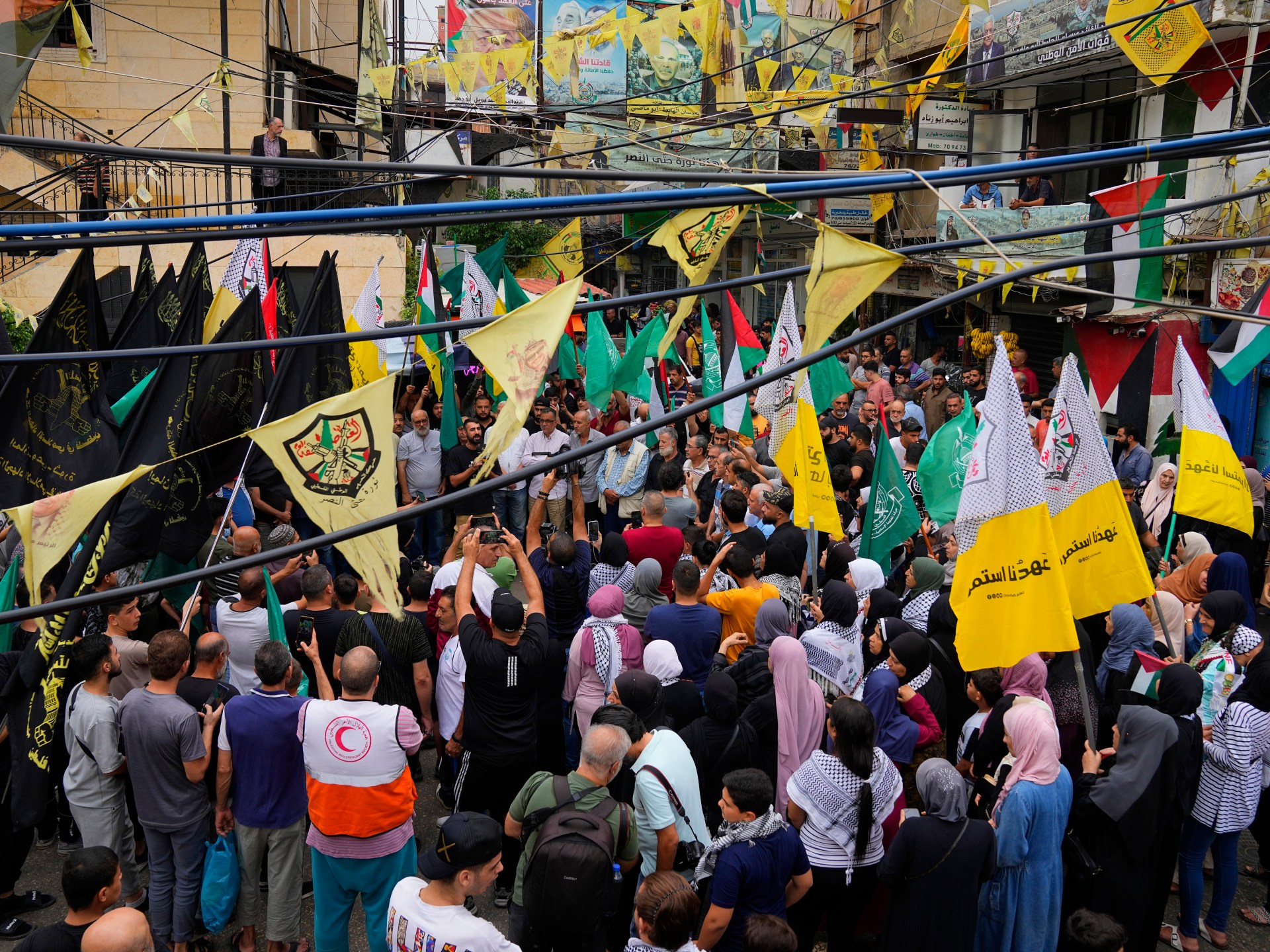
Beirut, Lebanon – When Hamas issued a call for recruitment in Lebanon on December 4, several mainstream Lebanese political parties and officials condemned the move, accusing the Palestinian group of violating their country’s national sovereignty while recalling memories of it bloody civil war.
But recruiting for a parallel force could ultimately serve that purpose Hezbollah interestsAccording to analysts, this is due to the Lebanese group’s military hegemony, especially in southern Lebanon. Hamas is believed to be recruiting in Lebanon through announcements in the country’s Palestinian refugee camps and mosques there.
“Hezbollah is trying to gain the support of Sunni groups [like Hamas in Lebanon] in its fight against Israel from southern Lebanon,” Hilal Khashan, a political science professor at the American University of Beirut, told Al Jazeera. But all other actors will not be able to act independently because “Hezbollah completely controls the border situation.”
After Hamas attacks in southern Israel on October 7, which Israeli officials said killed 1,200 civilians and military personnel, Israel has bombed Gaza continuously, with only a brief lull in fighting in late November. According to the Ministry of Health there, more than 18,000 people were killed in Gaza.
In neighboring Lebanon, more than 100 people have died since Hezbollah first attacked Israel with rockets on October 8. Most of the dead are Hezbollah fighters They have enlisted the Israeli military in an alleged effort to prevent the full force of their opponent from moving against Hamas.
The “Axis of Resistance” in Lebanon
Relations between Hamas and Hezbollah have resumed in recent years after a split over them civil war in Syria. Members of Hamas’s leadership left their former base in Damascus in 2012 after condemning Syrian President Bashar al-Assad’s brutal crackdown on protests.
As of 2017, some Hamas members returned to Lebanon, including Saleh al-Arouri, the deputy head of the Hamas Politburo; Khalil al-Hayya, Hamas’s head of Arab and Islamic relations; and Zaher Jabarin, responsible for matters related to Palestinian prisoners in Israeli prisons.
Last year, the Hamas leadership revealed the existence of a “common security space” for the so-called “Axis of Resistance” – an Iran-linked military coalition that includes Hamas and Hezbollah, among others. Some analysts believe it could be based in Lebanon. And in April 2023, Hamas chief Ismail Haniyeh visited Hezbollah leader Hassan Nasrallah in Beirut.
Analysts say it is unlikely that Hamas would call for expansion in Lebanon without first consulting Hezbollah.
Hezbollah has maintained dominance in southern Lebanon for decades. But Israeli officials recently said they can no longer accept the presence of the group or its elite Al-Radwan unit on Israel’s northern border. Therefore, according to some analysts, Hamas’ growing presence in Lebanon could be a tactical decision that also serves Hezbollah.
“Hezbollah is looking for local allies in the post-war period because its military component is being questioned as Israel wants to take them out of southern Litani,” Khashan said. After the war between Hezbollah and Israel in July 2006, the United Nations Security Council passed Resolution 1701, which established a demilitarized zone from the Litani River, Lebanon’s longest river, which flows from the southern coastal city of Tire to the Bekaa Valley to the well-known places called the “Blue Line”.
But Hamas’ expansion in Lebanon would not only benefit Hezbollah. While Hamas is under siege in Gaza, its popularity has grown in the West Bank. after to a current opinion poll. In Lebanon, the group may seek to exploit its growing popularity and oust its political rival Fatah.
By expanding its cadre in Lebanon, “Hamas can say that we have strengthened our political position wherever we live,” Drew Mikhael, an expert on Palestinian refugees in Lebanon, told Al Jazeera. “No political actor or party doesn’t want more power.”
A return to “Fatahland”
Still, the announcement caused a stir in some communities in Lebanon.
“We consider any armed action emanating from Lebanese territory as an attack on national sovereignty,” said Gebran Bassil, the leader of the Free Patriotic Movement, a predominantly Christian party, rejecting the creation of a “Hamas country” as he called it.
It was a reference to “Fatahland,” a throwback to a time when the Palestine Liberation Organization (PLO) under Yasser Arafat operated as a state within a state in southern Lebanon from the late 1960s to the early 1980s. The PLO used southern Lebanon for attacks against Israel and took an active part in the Lebanese Civil War in 1975.
Further condemnations also came from figures such as Lebanon’s caretaker prime minister Najib Mikati; the head of the right-wing nationalist party Lebanese Armed Forces, Samir Geagea; a former police chief and current MP, Ashraf Rifi; And Samy Gemayelwho leads Kataeb, a traditional Christian party that in recent years has, among other things, tried to transform itself into a center-right nationalist party.
While the warning was issued by politicians across the sectarian spectrum, the reference to a return to “Fatahland” was particularly raised by several Christian leaders. Resentment against Palestinians over the role of the PLO and other factions in the civil war is still widespread in Lebanon, particularly among parts of the Christian community, although many are sympathetic to the current suffering in Gaza.
“Complete Christian marginalization”
With the world’s eyes on Gaza, Lebanon’s Christian leaders could use the announcement to pursue cross-sectarian politics and give an edge to opponents in Lebanon, analysts say.
“Bassil’s entire career has been an attempt to strengthen the rhetoric of an ethno-national discourse,” said Mikhael. “Most of the time he doesn’t speak to a national audience. It’s an internal battle with Geagea.”
Bassil and Geagea lead the two largest Christian parties in Lebanon. But despite their stature, both are divisive figures who are deeply unpopular outside their immediate support base.
According to Michael Young of the Carnegie Middle East Center in Beirut, the internal wrangling is a sign of a Christian retreat from national politics in Lebanon.
“There is complete marginalization of Christians on most issues today,” Young told Al Jazeera. “When it comes to issues of national discussion, they seem to become more and more provincial. Christians do not pay much attention to Palestinian politics and are spiritually almost separated from the Lebanese state.”






Recent Comments